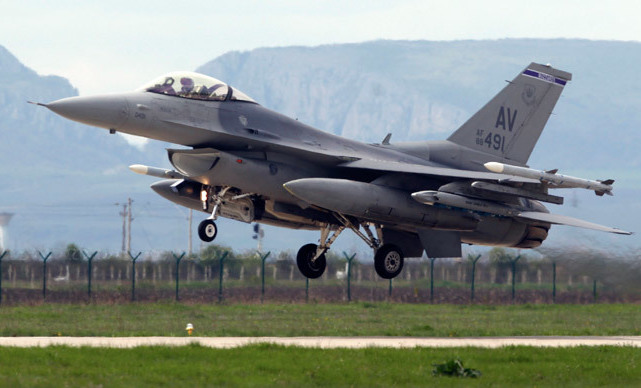 (Photo: Reuters)
(Photo: Reuters)
Updated: August 10, 2014
The United States carried out a new round of airstrikes against Islamic State militants in northern Iraq on Sunday.
The Pentagon said fighter jets and drone aircraft destroyed an armed truck that was firing on Kurdish forces near Irbil, and then followed up with four more attacks on other armed trucks and a mortar position.
It was the fourth set of U.S. airstrikes since President Barack Obama last week authorized the country’s first campaign in Iraq since he withdrew all U.S. forces at the end of 2011 after nearly a decade of American involvement.
U.S. forces are attempting to blunt an offensive by the extremist Islamic State group that threatens to overrun Irbil, the capital of Iraq’s semi-autonomous Kurdish region. U.S. and British aircraft also are supplying humanitarian aid for thousands of displaced Christians, Yazidis and other religious minorities trapped in the area.
Late Sunday, the U.S. State Department said it has temporarily removed some staff from the U.S. consulate in Irbil.
A statement said some of the personnel were dispatched to the southern city of Basra, and others to the Jordanian capital, Amman. It said the move was made “out of an abundance of caution rather than any one specific threat.”
Watch related video by VOA’s Michael Bowman:
Concern over militants’ brutality
Iraq’s Human Rights Minister Mohammed Shia al Sudani told Reuters that Islamic State militants executed at least 500 Yazidis after seizing the town of Sinjar, and that some of the victims had been buried alive.
The U.S. military made three airdrops with more than 52,000 meals and thousands of liters of fresh drinking water for the displaced people on Mount Sinjar. British forces made their first humanitarian airdrop to the region on Sunday and France said it would supply “several tons” of aid.
Obama said Saturday the U.S. military’s airstrikes in Iraq have successfully destroyed arms and equipment that Islamic State militants could have used against Irbil. He said the problem posed by the group will not be solved in weeks and is going to take some time.
U.N. Secretary-General Ban Ki-moon says he is “deeply concerned” about the evolving humanitarian and security situation in Iraq. The U.N. chief called for “reason and wisdom to prevail.” He urged all Iraqi leaders “to form a broad-based government that is acceptable to all components of Iraqi society.”
Pope Francis on Sunday urged the international community to find a solution to the problems in Iraq, where he said the situation leaves him in disbelief.
French FM visit
On Sunday, French Foreign Minister Laurent Fabius arrived in Iraq for talks in Baghdad and Irbil. He urged Iraqi leaders to form a broad-based unity government.
At a press conference with Kurdish leader Massoud Barzani in the capital of Iraqi Kurdistan he said that Islamic State militants were extremists who cannot accept those with different beliefs
He said that people are suffering because the Islamic State group, which he called the “Caliphate of Hate,” wants to kill or enslave all those who do not believe as they do.
For his part, Barzani thanked the U.S. and France for their assistance and indicated the Kurds were not demanding that their allies “fight for them,“ but help by giving “needed weaponry” and “air support” to the Peshmerga fighters to defend themselves.
The International Organization for Migration says the number of internally displaced people in Iraq now totals more than 1 million.
Islamic State extremists, most of whom are Sunni Muslims, have captured significant amounts of military hardware that U.S. troops turned over to Iraq’s Shi’ite-led government and to Kurdish Peshmerga fighters before the U.S. military withdrawal in 2011.
The Islamic State group, known for particularly brutal tactics, currently controls a large swath of eastern Syria and northwestern Iraq. It has declared the area a “caliphate,” and is actively recruiting other fighters to join the group.
On the ground
Meanwhile, Kurdish fighters known as Peshmerga say they have regained control of a district near Irbil, the capital of Iraq’s Kurdistan region.
Talking to VOA’s Kurdish Service Sunday, a Peshmerga fighter said his forces repelled an attack on Makhmur district from fighters of the Islamic State group.
Saber Ismael said that there were no more gunshots inside Makhmour city and that the Daesh, as Kurds refer to Islamic State militants, have fled.
He said local people now feel safe from an immediate threat by the radical group of Sunni fighters that have taken control of several areas of Iraq.
Speaking from Duhok, another town in the Kurdish region of Iraq, a VOA stringer said U.S. air strikes against Islamic State fighters are proving effective.
“People in the area are relieved and highly motivated because they now see that Peshmerga fighters are now being backed up by U.S. air strikes against the militants of Islamic State fighters,” said VOA Kurdish Service stringer Salam Balayi.
—
Edward Yerenian contributed to this report from Cairo, Kokab Farshori contributed from Washington. Some information provided by Reuters and AP.
Join the conversation on Twitter and Facebook.

























